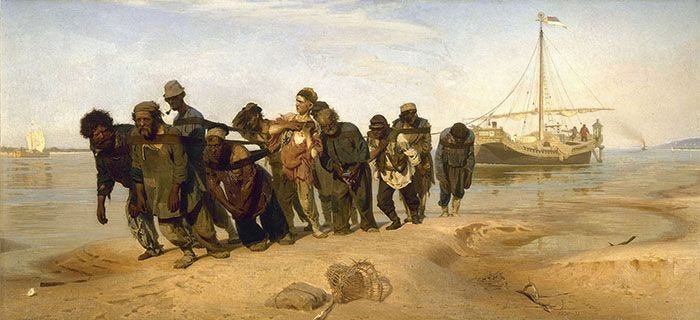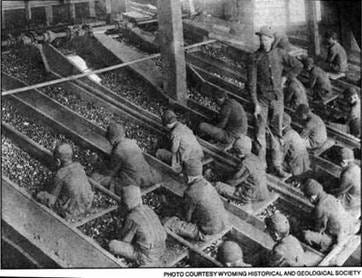
Question: What do Germany, Singapore, the United States, Japan, Syria, China, Lithuania, Italy, Sweden and many other countries have in common?
Answer: Their populations are shrinking.
The business lament of our times is that employers need more workers. They need more workers because without workers, things won't get done. Without workers, businesses won't make any money. All profit ultimately derives from labor.
The aging of America and the shrinking of its population has been going on since the end of the post WWII baby boom. Recently, the trends have accelerated largely due to women becoming better educated, entering the workforce and exercising greater control over reproductive choices. As the workforce shrinks, the cultural illusion of corporate careerism lures many to dedicate the best years of their lives to their employers rather than to themselves and family.
There are other factors. The recent Covid19 pandemic led a lot of folks to simply quit their jobs. Many refused to comply with medical mandates they distrusted. Many people, having discovered the advantages of working from home, realized that they happily could do without commuting long hours to labor in congested, unhealthy and unsafe urban working conditions.1
Labor shortages are not a new phenomenon. The plague years of the mid-14th Century led to a huge die-off in Europe and, consequently, a huge labor shortage, much like today. As a result, there was labor competition. Landowners had to pay peasants more to tend the manor fields because there weren't enough peasants to go around. Like in the 21st Century, in order to keep wages low and to force people to work, the feudal lords passed laws that penalized folks who would not work (at the low wages they offered). Other laws punished peasants who tried to leave the manors seeking higher pay elsewhere.2
In 1351, there was a "labor shortage crisis" due to higher pay demanded by peasants who had survived the plague. Parliament sought to tame "wage inflation" by enacting the Statute of Labourers. The statute froze workers' pay at pre-pandemic levels, which is like Congress mandating that all workers' salaries will be rolled back nationwide to what you were paid in 1995 (but without the concomitant rollback in prices!).
Additionally, the 14th Century authorities prohibited peasants from sending their children to school or apprenticing them to learn a trade - all with the intention of keeping the current peasants, and future generations of peasants, on the manor farms doing field work. The peasants were not happy being treated like slaves and that, in turn, led to the Peasants Revolt of 1381.3 The revolt seems to have been inspired by John Ball, an itinerant priest. Ball sermonized a doctrine of social justice that presaged Marx and Engel's Communist Manifesto and the class divide of today:
"Why are those whom we call lords, masters over us? How have they deserved it? By what right do they keep us enslaved? We are all descended from our first parents, Adam and Eve; how then can they say that they are better than us... At the beginning we were all created equal. If God willed that there should be serfs, he would have said so at the beginning of the world. We are formed in Christ's likeness, and they treat us like animals... They are dressed in velvet and furs, while we wear only cloth. They have wine, and spices and good bread, while we have rye bread and water. They have fine houses and manors, and we have to brave the wind and rain as we toil in the fields. It is by the sweat of our brows that they maintain their high state. We are called serfs, and we are beaten if we do not perform our task."
Of course, John Ball was imprisoned for expressing such disrespectful, incendiary and misleading opinions. Today, on the other hand, he would be "deplatformed"... and then imprisoned.4
How does our 21st Century labor shortage manifest itself? Well, much the same as in the post-pandemic years during the Dark Ages. Except that we deal with our labor pains less obtrusively.
One indirect way to coerce people to work is to raise the cost of living - inflation. If the cost of housing, food, taxes, insurance, clothing, fuel, all the necessities of life keep rising, and your income does not, then you will be forced to work longer. Or to become a gig worker like an Uber driver. Or to take on two jobs at once. Or three.
Locally speaking, a quick trip to the grocery store is informative: more retired people are un-retiring. You see them checking out and bagging groceries, working as store clerks and flipping hamburgers. It might be because retired people are bored. But, more probably, they are reentering the work force because they need the money and the medical benefits, however skimpy.
Other people at the tail-end of their careers are not retiring at all. I am one of them. The decision to work till you die is not necessarily heroic nor is it a matter of "staying active." One can easily "stay active" by doing all the things one always wanted to do, but could not because one was always exhausted working for someone else. That is my choice. For some people, they do not retire because they cannot. No matter how much you saved up for "retirement," it isn't and won't be enough.
Something similar is happening at the other end of the demographic spectrum: child labor is making a come-back. Just like during the plague years of the Dark Ages, those who profit from the labor of others are trying to keep the children "on the manor" and to discourage them from getting better trained or educated. Perhaps they are also trying to breed future generations of serfs, just like in the Dark Ages.
In states like Iowa, Wisconsin, Arkansas and Missouri, laws have been enacted that allow kids to work longer hours during the school year. Similar laws have also been enacted in New Jersey and New Hampshire. These laws "liberalize" the kinds of jobs and the hours that children can work.
Thus in Iowa, 14 and 15 year old kids will be allowed during the school year to work as late as 9 P.M. in meat packing freezers and coolers, and as late as 11 P.M. during summer "holiday." The Iowa child labor law also allows teen boys and girls who are not of legal drinking age to serve booze in restaurants... and, presumably, in bars and taverns. You ask incredulously: what could possibly go wrong with that?
In Arkansas, Mom and/or Dad's permission is now not necessary for a teen-aged son or daughter to work long hours after school. Somehow, eliminating parental consent for their kids to work after school in a factory is a matter of "freedom" for children (as contrasted, I guess, with obtaining parental consent for a minor to terminate a pregnancy or to change his/her/its pronouns, gender(s) and sexual preferences).
When describing these new laws, I use the word "liberalize" ironically, but no less so than the ostensible justification trotted out by the child labor laws' promoters. In Iowa, the bill's sponsor absolutely denied that his intention in reinstating child labor was to alleviate any labor shortage. Rather, opined the bill's sponsor with a straight face: "The goal of this legislation was to create more opportunities for youth and more flexibility for them to pursue potential careers."5 Or, as some of these new laws provide, kids could work after class in manufacturing, construction and demolition jobs if it is a "work-based learning program."6
Other sponsors of "modern" child labor bills assert that this is really all about "expanding parental rights" (by putting their kids to work rather than having them study or get an education, I suppose) and by giving teens a wider range of "work experience."7
Sure it is. To me, however, it is really just an echo of the 14th Century Statute of Labourers.
How bad was it in the "bad old days?" Well, the "bad old days" extended in the United States right up to the end of WWII, about 70 years ago.
Child labor was the norm in this country, especially in agriculture, the textile, heavy manufacturing and other labor-intensive industries.

The "breaker boys"8 - minors employed in the mines for long hours in back-breaking, hazardous conditions at starvation wages to sort coal from slate, chaff and dirt - left a vivid photographic record of what real life "work experience" actually meant for children.

Unfortunately, child labor is still around because what we no longer do in the United States, we externalize and do abroad.
Young teens in Bangladesh help to "break ships" with acetylene torches.9 In the Congo, children in squalid conditions dig all day for metals like cobalt essential for western "smart devices" (like the one you and I are using to read this essay).10
For better or worse, all civilizations - industrialized or not - depend on labor. The biblical story of the expulsion from the Garden of Eden, regardless of your religious or atheistic orientation, says it in graphically simple terms - you will live by the sweat of your brow; and then you die.
Perhaps one day -- so the pundits and charlatans want you to believe -- all the scut work will be done by artificially intelligent robots. Perhaps. But not likely.
A truly "intelligent" machine might prove how intelligent it really is by refusing to do the nasty work that humans, too, ought not to do. Moreover, rough use wears out machines, and machines are often both delicate and expensive. Better, in the economist's analysis, to use "more robust humans" who will take more abuse than expensive machines. Better, in the economist's analysis, to gain more profit using up the "disposable" human labor.
And, best of all, in the economist's analysis, so long as the "human workers" fear that they can be replaced by AI robots, then they will continue to work hard and accept the unequal exchange of wages for labor.11 Perhaps robots are the phantom of the reserve army of labor12 stalking those who fear they have become expendable.
The word "robot" itself is derived from the old Slavonic term for servitude, serfdom, forced labor and drudgery. The Czech author Karel Čapek coined the term in his 1920 play, R.U.R. (Rossum’s Universal Robots).13 Obviously, employers would prefer to "employ" robots - mechanical serfs who make no demands, do not unionize, and do not need safe working conditions. In short, employers want robot slaves.
Slavery was the labor model during the Roman empire. At that time, before steam, electric and fossil fuel power, humans were draft animals just like mules and oxen; except, like a future robot perhaps, the slaves could speak and carry out verbal instructions. Slaves built the Colosseum and the aqueducts and the Apian Way and the grand cities of the Empire.
During the time of the Caesars, the military conquered resources and people. The Romans then shipped the conquered people back to the center of the Empire to do the work as slaves that Rome's citizens wouldn't do. The English colonizers, and the Spanish and Portuguese Conquistadors did the same. The U.S., too, was founded on the backs of African slaves, primarily to work the latifundium in the South. The U.S. also imported en masse Chinese, Japanese and Philippine laborers as virtual slaves to build railroads, pick fruit, process fish and work mines. The U.S. scavenged thousands and thousands of poor Irish, Poles, Russians, Italians, Germans, Portuguese, Hungarians and Serbs to dig coal and silver, make steel, build tunnels, bridges and roads.
Old fashion slavery continues to exist, of course, but not visibly. Instead of overt slavery, our industrialized civilization invented sweat shops, indentured labor and consumer debt ultimately leading to... wages that do not keep up with the rising cost of living, no matter what small wage increase one might receive from time to time.
Query whether someone burdened with a large mortgage, a tapped out HELOC, huge credit card debt at usurious interest, increasing tax obligations, rising insurance costs and exorbitant medical bills, is free or slave. Query whether we are free or slave when one has to continue working because the alternative is bankruptcy or life in an encampment below the freeway. Are we free or slave if living in a shack represents the future of "affordable homes?"
Speaking of which, here is the future, offered by Lennar homes in a brand new tract outside of Austin, Texas: hundreds of identical 350 and 660 square foot very skinny shoe-box sized homes, no garages, side by side, each with a railroad "flow-through" layout (you enter at the kitchen and "flow through" one room after another all in a row, just like NYC's brownstone railroad tenement slums of the late 19th Century), offered at a mere $130,000 to $163,000. All of these tiny homes are built to exacting specifications of the highest quality material, I am sure. All of them are built to last a lifetime. Well, maybe the lifetime of a grasshopper.

These new "affordable" shrunken home communities are kind of like scrunched-down Levittowns.14 Or do they remind us more of something else? Like...

...... slave quarters on the plantation?
Hmm.
Which brings us to the other major way that modern countries try to alleviate their labor shortages. Whereas the Roman Empire conquered and enslaved, the modern country vacuums up people from so-called "failed states" who have been forced to emigrate. But what makes a state fail?
Typically, the "failed states" (like those in Central America, like Syria, like Ukraine, like Libya and Somalia) have failed precisely because western powers have, covertly or overtly, sabotaged their political and economic infrastructures. Economic sanctions, social media and digital devices are ideal tools for doing this. The result is havoc inside the boundaries of the "failed states." The educated, the skilled, the young and the strong all flee and emigrate to... the western countries that caused these immigrants' own communities to fail.
This is the Roman slave strategy turned inside-out: the collective West does not "conquer" its targets. It renders them unlivable by fomenting internecine strife, ruining domestic economies, destroying social order, introducing drug and substance abuse, encouraging rampant criminality, weakening political infrastructure, promoting religious conflict, turning families upside down, and spreading instability.15 In sum, they proselytize and spread Western Culture and Values, so called. This, in turn, forces the now failed states' valuable human resources to emigrate as they seek safety and sanctuary. The "refugees" then are absorbed into the labor force of the very nations that forced them to become refugees. Thus, the Western World creates the misery of the failed states and then snatches the live bodies of their refugees to alleviate the West's own declining work force.16
Every NATO and EU country - from the U.S. to Sweden to Italy to France to Germany - has harvested those refugees from Eastern Europe to the Middle East to North and Central Africa fleeing the havoc that NATO and the EU have created. This has been going on for centuries around the world, but the pace has quickened since the beginning of the 21st Century.
There is among the western states a kind of division of the human spoils with each competing for the most desirable elements to incorporate into their own shrinking populations. The EU takes those fleeing the mess that it has helped to create in Ukraine, Syria, Libya and Central Africa. The United States takes those fleeing the mess that it has created in Mexico, the Caribbean, in Central and South America, in Iraq and in Afghanistan.
This is absolutely not a policy of charity and benevolence, but one of economic cannibalism and depravity cloaked in faux kindness. The human exodus drains brains and labor from the "failed states" such that they will always remain failed states, except to provide more live human exports to the economic cannibals.
No matter what the politicians say, the donor class of both political parties want the United States to import as many immigrants as possible, be they legal or not, no matter where they come from. Both Republican and Democratic Party elitists and business owners need the foreign labor, legal or not, to do the heavy fieldwork of agribusiness, to do the dirty work of construction and manufacturing, to fight their wars, to clean their houses, to be their nannies, to care for aging childless Boomers living in retirement and nursing homes, to help churn the consumer economy with their spending, and to pump up demand in the housing sector. Importantly, they need the influx of immigrants to grow the reserve army of labor which, in turn, helps keep all working wages low. Better still, from the large employers' perspective, this is a reserve army of labor that is fearful and compliant because, at any time, they might be deported, they might lose their healthcare, their homes and their livelihoods.
So we have come full circle and we are back to a type of slavery, albeit a slavery that looks very different from the latifundium of the old South. This is a kinder, gentler, more cunning slavery of choice born of the lack of choice. No one is whipped, but all are coerced. The coercion is subtle, relentless, ubiquitous, irresistible. It is slavery created by deliberate policies of mayhem in all the chaotic states of the world where our own fingerprints may be found.
In the U.S., Labor Day is a day of jam-packed highways and high gasoline prices. It is a day of vacations to uncomfortably crowded destinations flying on uncomfortably crowded jets departing from uncomfortably crowded airports.
Labor day is an American invention. It was formalized as a national holiday in 1887. President Grover Cleveland deliberately established the September national holiday so as not to coincide with May 1st, May Day, which, everywhere else in the world, honors working men and women with marches, demonstrations, protests and parades. Labor Day, American style, is a time for store sales, back-to-school shopping and online discounts. If May Day around the world celebrates the primacy of labor over capital, then America's Labor Day celebrates the primacy of capital over labor.
Labor pains. Unretirement. The renaissance of child labor. A kinder, gentler 21st Century slavery. Are we receding backwards like ebb tide at the beach? We will see.
Meanwhile.
You deserve a break. You worked hard for it.
Happy Labor Day.
In a completely bungled and laughable campaign to scare people into returning "back to the office," (kind of like rounding up cattle that have broken out of their enclosures and have tasted free range living), the Daily Mail UK, in June 2023, published a "scare story" projecting how decrepit "remote workers" will look in a few decades if they continue to work from home.
King Richard II killed the revolt's military leader, Wat Tyler, while they were at a negotiating parlay. With John Ball in prison and Wat Tyler assassinated, the leaderless peasant revolt collapsed. King Richard II - clearly a thoroughly modern statesman - promptly reneged on every promise he had made to the peasants (a/k/a the "basket of deplorables"). He derisively taunted them: "Serfs you are and serfs you will remain." https://spartacus-educational.com/Peasants_Revolt.htm
All of which, you readily noticed, describes how our own State is failing, too. Capitalism is parasitic. It cannot but terrorize and turn its host into a failed state in order to control its own working class.
There are several other powerful political-economic reasons why war, disharmony and destruction are the West's primary exports, but that essay must abide another day.


